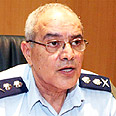
Lt. Gen. Dan Halutz
צילום: עופר עמרם
Halutz: If Lebanese won't deploy, we won't leave
In briefing to Foreign Affairs and Defense Committee, chief of staff says operation to arrive at Litani was delayed 48 hours because of political echelon; adds Hizbullah operatives fought with 'determination reminiscent of suicide bombers'
In a Wednesday briefing to the Knesset's Foreign Affairs and Defense committee, IDF Chief of Staff Lt. Gen. Dan Halutz said that "the last ground offensive, in which forces reached the Litani, was supposed to begin 48 hours earlier than it did, but was delayed because the political echelon asked to find a diplomatic solution."
He added: "If the Lebanese army will not deploy southwards in order to receive control from UNIFIL forces of areas currently in IDF control, then, to my understanding, we must stop pulling our forces out of Lebanon."
Halutz told committee members that "this is not the time for summaries. The IDF is still in the field and, in recent days, managed to kill eleven terrorists. Nonetheless, we can say that thus far Hizbullah seems to be honoring the ceasefire. We need to look at Hizbullah in two dimensions: firstly, in the physical dimension – as fighters, and secondly, in terms of ideology."
"A military force along cannot solve the problem of Hizbullah armament, but it can create better conditions for the political echelon. The objective of the fighting was not the elimination and disarmament of Hizbullah, but rather, it was to take over 100 of kilometers of land, and to find each rocket. We had a 90 percent success rate in destroying long-range rocket launchers in Hizbullah's possession," he added.
The chief of general staff addressed questions regarding IDF operations and conduct during the fighting: "There are many difficult questions that must be investigated. We must draw conclusions, from the top to the bottom. Starting with me and moving downwards through brigade and division commanders."
Need for change in approach
"There are things that we need to fix, quickly, such as command and control, logistics, tactics and force activation. I do not eliminate the possibility that the situation could deteriorate – as an army, we must be ready. I instructed the deputy chief of general staff to examine all professional issues that need to be investigated."
Halutz described the strenuous combat and emphasized: "This was not an operation, it was a war. The other side demonstrated a determination reminiscent of suicide bombers, but in all of the one-on-one battles, the IDF, without a doubt, finished with the upper hand."
Halutz also pointed an accusing finger at Syria and said, "Hizbullah was fed by Syria and not only be Iran. It may be that Iran paid and trained the fighters, but Syria was the primary arms dealer. Assad said Tuesday that 'we had prepared for this fight for five years' – in other words, he sees himself as a partner in this affair."
The chief of staff was asked about the IDF's heavy losses from anti-tank missiles. He responded that "during the fighting, there was a need for a phase change, a change in approach, a change in the way we thought tactically about the fighting. We issued instructions, during the course of the conflict, but there were still mistakes that repeated themselves. Rafael Industries has developed an anti-tank missiles system that is very effective, but it costs half a billion NIS."
Regarding the initial ground offensive, Halutz said he was certain that "if we had done it from the very beginning, we would have suffered a heavier price and we would have found ourselves in a completely different situation, particularly concerning the international community."










